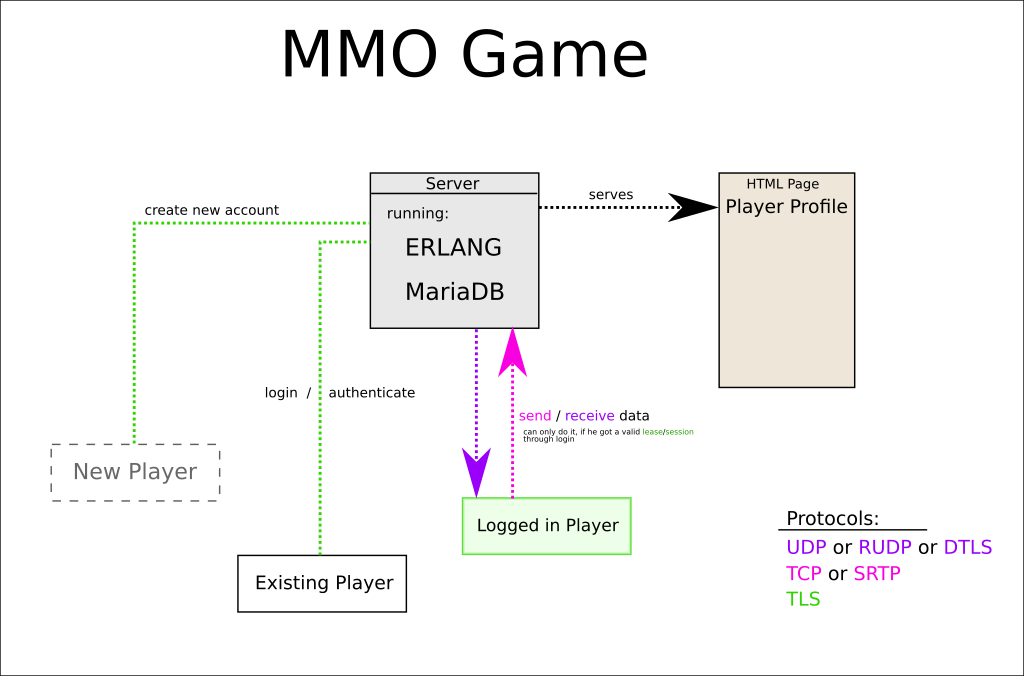EDIT: I don't think any of this helps for mobile dev, but it could be interesting to others so I'll leave it.
I'm doing the "third option" written above. If you like c++, Enet is good for the udp connections, cpp-httplib is good for the https server and client, and OpenSSL is good for the encryption, decryption of udp packets.
http://enet.bespin.org/
https://github.com/yhirose/cpp-httplib
https://www.openssl.org/source/
Here is a class I use in my game to encrypt and decrypt data that goes in my udp packet.
#pragma once
#include <openssl/evp.h>
#include <openssl/aes.h>
#include <openssl/rand.h>
#include <openssl/err.h>
#include <string>
#include <iostream>
//if debug isn't defined, turns into a no-op
template <typename ...T>
void debug(std::string file, int line, T&& ...args)
{
#ifdef _DEBUG
unsigned int index = file.find_last_of('\\');
file[index] = '/';
index = file.find_last_of('\\', --index);
std::string finalfile = file.substr(index);
finalfile[0] = '/';
std::cout << finalfile << ":" << line << " ";
using expander = int[];
(void)expander {
0, (void(std::cout << std::forward<T>(args)), 0)...
};
std::cout << std::endl;
#endif
}
//use this, it outputs the file and line the output was made from!
#define debug(...) debug(__FILE__, __LINE__, __VA_ARGS__)
namespace ga {
class cryptinfo {
EVP_CIPHER_CTX* ectx;
EVP_CIPHER_CTX* dctx;
void fillectx()
{
debug("making new encryption ctx");
if (!(ectx = EVP_CIPHER_CTX_new())) handleErrors();
debug("setting ctx encryption engine to EVP_aes_256_cbc()");
if (1 != EVP_EncryptInit_ex(ectx, EVP_aes_256_cbc(), NULL, NULL, NULL)) handleErrors();
debug("initializing ctx with key and iv", key, " ", iv);
if (1 != EVP_EncryptInit_ex(ectx, NULL, NULL, key, iv)) handleErrors();
debug("making new encryption ctx good");
}
void filldctx()
{
debug("making new decryption ctx");
if (!(dctx = EVP_CIPHER_CTX_new())) handleErrors();
debug("setting ctx decryption engine to EVP_aes_256_cbc()");
if (!EVP_DecryptInit_ex(dctx, EVP_aes_256_cbc(), NULL, NULL, NULL)) handleErrors();
debug("initializing ctx with key and iv");
if (!EVP_DecryptInit_ex(dctx, NULL, NULL, key, iv)) handleErrors();
debug("making new decryption ctx good");
}
void filldectx()
{
debug("make both encryption and decryption ctx at the same time");
fillectx();
filldctx();
debug("make both good");
}
void handleErrors(void)
{
unsigned long errCode;
debug("An error has occured in encryption/decryption");
while (errCode = ERR_get_error())
debug(ERR_error_string(errCode, NULL));
debug("should we really exit here?");
system("pause");
abort();
}
friend char* operator<<(char* os, cryptinfo &e);
friend char* operator>>(char* os, cryptinfo &e);
friend std::ostream& operator<<(std::ostream &os, const cryptinfo &e);
friend std::istream& operator>>(std::istream &os, cryptinfo &e);
public:
uint8_t key[33];
uint8_t iv[AES_BLOCK_SIZE + 1];
void fillkeyiv()
{
debug("creating new key and iv for a cryptinfo");
debug("creating key");
RAND_bytes(key, sizeof(key) - 1);
key[32] = '\0'; //always null terminate our data so we can toString() (hope that works out lol)
debug("creating iv");
RAND_bytes(iv, sizeof(iv) - 1);
iv[16] = '\0';
debug("creating new key and iv good");
}
int encrypt(std::string& encrypt_in, std::string& encrypt_out, unsigned char* aad = 0, int aad_len = 0)
{
debug("encrypt called");
fillectx();
debug("encrypting string ", encrypt_in);
int len;
int ciphertextlen;
unsigned char encrypt_in_buf[48];
debug("writing encrypted bytes to ciphertext");
if (1 != EVP_EncryptUpdate(ectx, encrypt_in_buf, &len, (const unsigned char*)encrypt_in.c_str(), encrypt_in.size())) handleErrors();
ciphertextlen = len;
debug("writing final bytes to ciphertext");
if (1 != EVP_EncryptFinal_ex(ectx, encrypt_in_buf + ciphertextlen, &len)) handleErrors();
ciphertextlen += len;
encrypt_in_buf[ciphertextlen] = '\0';
debug("free ctx obj");
EVP_CIPHER_CTX_free(ectx);
encrypt_out = (const char*)encrypt_in_buf;
debug("encrypted string ", encrypt_out);
debug("encrypt good");
return ciphertextlen;
}
int decrypt(std::string& ciphertext, std::string& plainstr, unsigned char *aad = 0, int aad_len = 0)
{
debug("decrypt called");
filldctx();
debug("decrypting string ", ciphertext);
unsigned char buf[48];
debug("writing unencrypted bytes to plaintext");
int len;
if (!EVP_DecryptUpdate(dctx, buf, &len, (const unsigned char*)ciphertext.c_str(), ciphertext.size())) handleErrors();
debug("writing final bytes to plaintext");
int oldlen = len;
int ret = EVP_DecryptFinal_ex(dctx, buf + oldlen, &len);
oldlen += len;
buf[oldlen] = '\0';
debug("freeing ctx obj");
EVP_CIPHER_CTX_free(dctx);
plainstr = (const char*)buf;
debug("the decrypted string ", plainstr);
if (ret == 1)
{
debug("decryption good");
return oldlen;
}
else
{
debug("EVP Decryption Error! check != -1");
debug("decryption failed, but the program could be configured to work anyway, sometimes the decrypted data comes out fine but it throws errors anyway, probably because something is coming up as insecure");
return -1;
}
}
std::string keyToString()
{
return (const char*)key;
}
std::string ivToString()
{
return (const char*)iv;
}
void keyFromString(std::string key)
{
strcpy((char*)this->key, key.c_str());
}
void ivFromString(std::string iv)
{
strcpy((char*)this->iv, iv.c_str());
}
};
std::ostream& operator<<(std::ostream &os, const cryptinfo &e)
{
debug("writing cryptinfo key and iv to stream");
debug("writing key");
for (int i = 0; i < 32; i++)
{
os << e.key[i];
}
os << e.key[32];
debug("key written");
debug("writing iv");
for (int i = 0; i < AES_BLOCK_SIZE; i++)
{
os << e.iv[i];
}
os << e.iv[16];
debug("iv written");
debug("writing cryptinfo to stream good");
return os;
}
char* operator<<(char* os, cryptinfo &e)
{
debug("writing cryptinfo key and iv to buffer");
debug("writing key");
for (int i = 0; i < 33; i++)
{
os[i] = e.key[i];
}
debug("key written");
debug("writing iv");
for (int i = 33, j = 0; i < 33 + AES_BLOCK_SIZE + 1; ++i, ++j)
{
os[i] = e.iv[j];
}
debug("iv written");
debug("writing cryptinfo to buffer good");
return os;
}
std::istream& operator>>(std::istream &os, cryptinfo &e)
{
debug("reading key and iv from stream into cryptinfo");
debug("reading key");
for (int i = 0; i < 33; i++)
{
os >> e.key[i];
}
debug("key read");
debug("reading iv");
for (int i = 0; i < AES_BLOCK_SIZE + 1; i++)
{
os >> e.iv[i];
}
debug("iv read");
debug("reading key and iv from stream good");
return os;
}
char* operator>>(char* os, cryptinfo &e)
{
debug("reading key and iv from buffer into cryptinfo");
debug("reading key");
for (int i = 0; i < 33; i++)
{
e.key[i] = os[i];
}
debug("key read");
debug("reading iv");
for (int i = 33; i < 33 + AES_BLOCK_SIZE + 1; i++)
{
e.iv[i] = os[i];
}
debug("iv read");
debug("reading key and iv from buffer good");
return os;
}
};








